Author(s): Chandra Sekhar Veluru
The travel industry has been undergoing a revolution for a few years now due to rapid technological advancements. This article assesses the application of Generative AI in travel planning, focusing on itinerary generation, low-fare finding, no-crowd planning, and route optimization. The study employed a quantitative methodology with 10 participants using an AI-powered website. Structured surveys gathered feedback on usability, efficiency, and satisfaction. Users were very satisfied with the AI-enhanced website, especially in terms of navigation, personalized itineraries, price accuracy, and data security. However, areas for improvement in time efficiency were indicated. The study concludes that Generative AI significantly improves trip planning, offering convenience, personalization, and efficiency. Future work should focus on refining AI features and exploring additional applications to further optimize travel planning.
Since the internet boom, the travel industry has been one of the most innovative and fast-evolving sectors. The travel industry keeps adopting the latest technology applications to improve customer experience and operational efficiency [1,2]. In recent years, Generative AI, and for that matter, Artificial Intelligence, has come to impact the sector. These are game-changers in providing best-in-class solutions that overwhelmingly elevate the respective dimensions of the travel planning process. It is proposed in this research to consider the influence of Generative AI and AI on the travel sector through the prism of its specific applications: itinerary generation, low-fare finding, no-crowd planning, and route planning [3,4].
Travel is one of the sectors where things have drastically changed from what they used to be, thanks to these applications of AI technology. AI has automated and optimized many previously manual and time-consuming processes in the travel industry. AI can process giant volumes of data at great speed and accuracy, improving services. For example, the travel industry has seen personalized recommendations made on user preferences and behavior. As per Tussyadiah, AI-powered customer service chatbots enable travelers to get immediate assistance and travel satisfaction [5]. Another significant application is dynamic price models, which optimize service prices on a real-time basis according to demand and supply. This increases the revenue for service providers and simultaneously offers competitive prices to service users [6].GPT-3 is an example of AI in Generative AI that has shown much potential for human-text generation, content generation, and automation of complex tasks [7]. In the travel industry, Generative AI can provide a highly personalized trip itinerary and travel content according to the user's preference, which is highly customized and convenient. This technology improves the experience of planning to travel. It saves much time and effort that would otherwise be lost in generating the perfect itinerary for a holiday. Itinerary generation, if not the most important, is an essential part of the travel planning process and has been revolutionized by AI. AI-driven itinerary generation systems can generate personalized travel plans for the traveler, considering user data and preferences. Indeed, much emanates from research that suggests that customized itineraries increase user satisfaction and overall experience during travel [4]. The structure of these AI systems goes as far as allowing them to suggest activities that one would want to engage in, accommodation, and dining alternatives that one would engage in, getting to a more enjoyed and quicker travel planning process.
Another innovation brought by AI is the no-crowd planner. This has come to the fore, especially in post-pandemic times. This tool helps predict crowded places and suggests less overcrowded alternatives to the satisfaction of travelers who prefer increasingly riding on safer, less crowded destinations. AI has this immense ability to analyze massive data and can handle real-time analytics, a la predicting crowd density, and subsequently help the traveler avoid the crowd – in a gist, improving the whole travel experience and ensuring better adherence to health and safety protocols [8,9]. AI has made immense contributions in the field. For instance, planners based on AI optimize efficient travel routes, including minimizing possible delays, distance, user preferences, and other factors. These not only make travel more convenient but also save time and cost of traveling [10]. This gives the most efficient routes, helping travelers navigate to an unfamiliar destination more quickly and confidently.
AI has also contributed to the field of travel by increasing security and privacy. For instance, AI-powered tools are in a position to monitor and analyze significant volumes of data, detecting actions that are potential threats to the traveler, hence ensuring the security of the traveler is maintained at all times [11]. Besides, AI ensures that all the personal information about the traveler is protected by advanced encryption and security protocols [12]. In the travel business, the following are just some of the many issues that have arisen due to the use of AI and Generative AI: The problem of data privacy, more significant investments in technology, and loss of jobs due to replacement with AI and Generative systems [13]. It's also essential to ensure the non-violation of ethical principles in AI technologies, such as the appearance of no biases in the AI- driven systems, and to avoid violating the moral code in favor of fairness and equity in the travel business [14].
In this background, the proposed research shall examine such applications of AI and Generative AI in the travel sector, focusing on their benefits, challenges, and overall impact. Towards this end, the mixed research approach would guarantee the qualitative and quantitative data and ensure an excellent understanding of how such technologies operate in the travel sector. Surveys and interviews will be conducted with travelers, travel agents, and industry experts to gather primary data. In contrast, the secondary data can be analyzed from the existing literature, case studies, and industry reports [15]. Concretely, the findings from this research point to the success of AI tools used in itinerary generation, fare finding, crowd planning, and route optimization. The quantitative data will be analyzed using statistical methods and represented in trends and correlations, while the qualitative data will be thematically analyzed to extract insights and patterns [16]. The following section will interpret these findings by relating them to the literature review and theoretical frameworks, addressing how AI and Generative AI have changed the travel planning process, what benefits they have seen, and what challenges they have met.
Finally, this article will summarize the main findings to underline the transformational role of AI in shaping the travel sector. Recommendations will be made on how stakeholders such as travel agencies, travelers, and technology developers may exploit AI for more rewarding travel experiences. This article also provides suggestions for future research studies with the heading of the continuation made in AI technologies and their application in the travel industry.
From the very inception of the internet, the travel industry has experienced substantial innovation and rapid evolution brought about by the relentless use of state-of-the-art technologies to better the customer experience and operational efficiency [1,2].
The sector has recently seen the rise of Generative AI and Artificial Intelligence (AI). These forces have upgraded many elements of the travel planning process with new tech and better ideas, whose efficacy has reached new heights. A critical literature review of Generative AI and its influence on the tourism sector focused on itinerary generation, cost savings, and comparing prices with multiple websites. The system is suitable for proposing travel plans according to the time of year (seasons) and weather conditions to lay down what has been described above. It also identifies gaps in the current implementation of Generative AI in the tourism environment.
The travel industry is traditionally at the forefront of incorporating new technologies that improve their service. The industry has long been leveraging technology for operational efficiency and enhancing customer experience, from the early days of computerized reservation systems (CRS) in the 1960s to global distribution system (GDS) development in the 1980s [3]. The industry saw a second transformation in the 1990s and early 2000s with the dot-com bubble as online travel agencies (OTAs) emerged, giving consumers more freedom and choice. The operational use of AI in the travel industry started with simple applications like chatbots and recommendation systems. The initial waves targeted enhancing customer service using chatbots, content customization, and recommendations [5]. The functionality has grown by leaps and bounds in AI using machine learning algorithms and natural language processing (NLP).
Generative AI models can disrupt how travel itineraries are generated today. Hence, these architectures can answer any kind of human text and generate full content or help in general tasks, such as automation tasks, to particular ones, like personalizing trips by producing travel stuff specifically for a user's preferences [7]. Generative AI can process a broader range of data, providing personalized trips that put people on the right foot faster [17]. These systems, powered by artificial intelligence, create customized travel itineraries based on user data and preferences. This is supported by research showcasing the positive relationship personalized travel itineraries have on user satisfaction and their overall traveling experience [18]. They could recommend activities, accommodations, and dining experiences according to the user's interest to make their travel planning more pleasant and effective [19].
Dynamic pricing models and price comparison tools are where AI in travel stands out. As you know, dynamic prices keep changing with the supply, high or low. Here is your true cost- saving potential. Artificial intelligence algorithms can analyze large volumes of data to discover patterns, predicting areas where airlines may publish low fares, making it easier for passengers to access cheap routes and accommodation [20]. With their ability to track the change in airfares and broadcast low prices, AI-based fare finders bring valuable support to holiday-makers [21]. In addition, AI can shop for real-time prices across several websites to ensure customers obtain the best offers. This capability is indispensable in an industry where prices change rapidly due to supply-demand dynamics [6]. Price comparison tools with AI capabilities help add transparency as AI enables better-informed price decisions and makes consumers satisfied and loyal.
AI can crunch large data sets and offer effective travel planning solutions considering the time of the year, weather season, etc. AI, for example, can suggest optimal windows to visit a location considering past weather data and when tourists generally flock or are followed by season-specific events [1]. By providing this level of information, travelers are better equipped to plan their trips to get the most from them and avoid potential problems. Given the season and weather, AI can advise you on the best things to do or visit at a destination. In winter, the AI can suggest indoor activities and destinations befitting cold regions; during summer, it can stimulate customers with outdoor experiences and seaside spots [2]. This individualized method of travel preparation aids in making sure that travelers possess a firsthand enjoyable experience.
No-Crowd Planning and Route Optimization Innovation The COVID-19 pandemic has dramatically altered transportation habits, increasing travel appeal to safer, less crowded destinations. This demand has given rise to AI innovations like the no-crowd planner. Utilizing AI's capability to process large datasets and real-time analytics, these tools predict crowded areas based on which they provide suggestions for less crow [8]. AI helps predict crowd density, suggest alternative destinations that offer a safer and better travel experience, and keep health safety protocols in place. Another area in which AI has converted the prospects of international students is that it has provided significant assistance in route optimization, assisting travelers in walking more competently through novel destinations. AI route planners convene factors like traffic, distance, user preferences, and possible delays to develop the most optimal routes [10]. This feature brings economic savings on travel and enriches the whole traveling experience by assuring travelers better reach destinations faster and safer.
AI can transform the travel sector in terms of security and privacy. With the help of AI power tools, they can also watch and monitor vast amounts of information and use that knowledge to identify potential dangers for travelers in grappling with suspects [11]. AI also secures travelers' private information with excellent encryption and security [22]. Our AI-driven travel apps can be trusted to the highest level of security possible.
Even with significant strides and gains, from the broad perspective of travel industry applications of AI, some challenges & gaps still prevail. Data privacy is one of the biggest worries. AI heavily relies on personal data, introducing concerns about data security and privacy [13]. Widespread acceptance of AI systems will depend on their adherence to data protection rules and the preservation of personal privacy. The other is the considerable investment necessitated in technology as well. One such barrier is the financial investment, where implementing AI solutions involves high costs that might face SMEs in the travel industry [14]. One of the biggest fears around automation is about jobs. If AI can do human tasks better, it may mean fewer jobs for humans - so we have to get ready and manage these changes accordingly through re-skilling and upskilling. Ethical thoughts must also be considered while adopting AI for the travel industry. Given the need for AI systems to be unbiased and operate fairly to continue being equitable and fair across the sector [14]. These ethical issues must be resolved to ensure users trust and use AI technologies.
To overcome the challenges and gaps of current adoption toward AI implementation in the travel industry, a few solutions might be proposed as follows:
The combination of AI and Generative AI in the travel industry has paved the way for various innovations, enhancing several segments in travel planning. AI-powered everything-from personalized itinerary generation and saving money to without crowd planning and optimized routing-has made the travel experience wow. But there are obstacles to confront and bridges yet to be built for AI to deliver on its travel industry promise.
This study uses a quantitative approach to use a Generative AI based travel website. Surveys will gather participant data, while interaction tracking and data analysis will assess usability, efficiency, and satisfaction with AI-generated travel services. This will help to understand the practical impacts and challenges of using AI in travel planning.
We recruited 10 travelers from various travel forums and groups. They were asked to use a website enhanced with Generative AI features like itinerary generation, low-fare finding, no-crowd planning, and route planning.
Data will be collected through structured surveys given to participants after they complete their travel planning tasks. The surveys assess different aspects of the travel planning process and participants' experiences. Interaction logs will track user behavior, time spent, and actions taken on both website versions.
This study has limitations, such as potential biases in self-reported data, variations in participant engagement, and the specific context of the travel planning tasks and participants.
Quantitative data will be analyzed using statistical methods to identify trends and correlations between traditional and AI- enhanced travel planning experiences. Interaction logs will provide insights into user behavior and the effectiveness of AI-generated content. Qualitative feedback will be analyzed to analyze the user patterns and interests so that this research can be helpful for future AI-drive and AI-enhanced travel services.
Chatbot Questions Asked
The very first question that was asked was to provide a travel itinerary for a trip to Kauai Island, Hawaii, and tentative travel dates are mentioned. The question had been asked as below:
Give me an itinerary for a family of 2 adults and 2 kids for a trip to Kauai Island, Hawaii. Tentative travel dates are between June 27th, 2024, and July 4th, 2024. I would like to have kids and family-friendly activities in the results. I need a leisure trip but not an adventure trip. Also, I would like to enjoy July 4th fireworks along with the dinner options.
The second question was about the travel and stay planning. The question is as below:
I need the cheapest possible flight tickets to travel from San Francisco, USA to Kauai Island, Hawaii, for 2 adults and 2 kids. Please make sure to provide 4 or 5 options with different timings. I prefer the flight start time to be during the afternoon times. Also, I need affordable accommodation options with a beachfront hotel or resort and easy access to the firework.
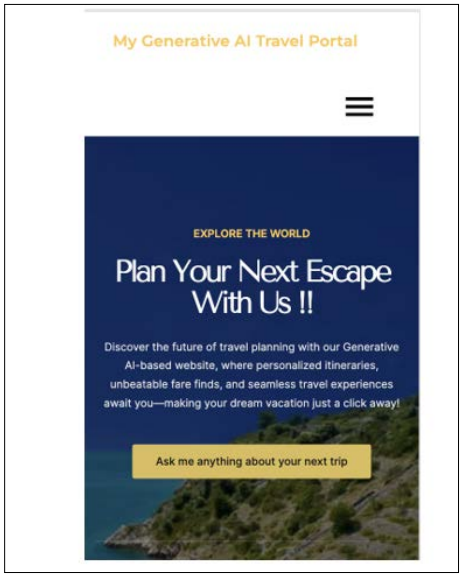
Figure 1: Travel Website Home Page
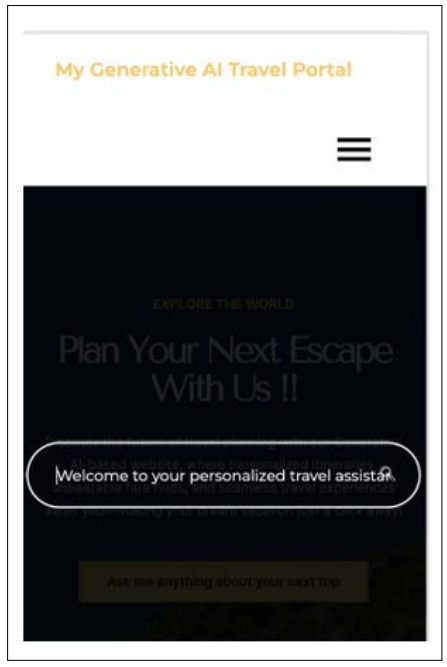
Figure 2: Travel Website Overlay Chatbot
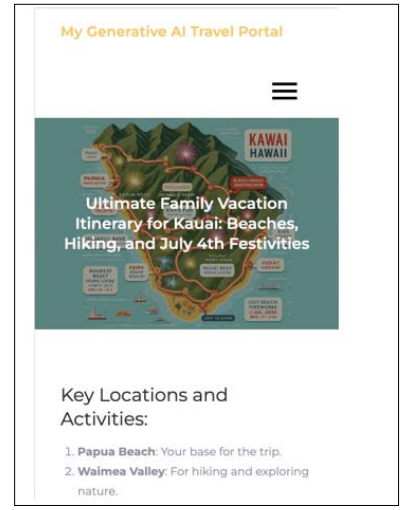
Figure 3: Page1 - Sample Itinerary
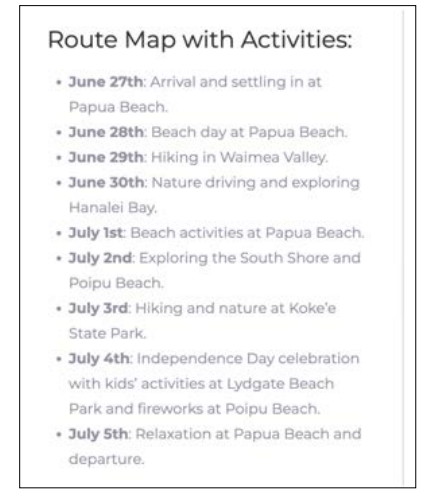
Figure 4: Page2 - Sample Itinerary
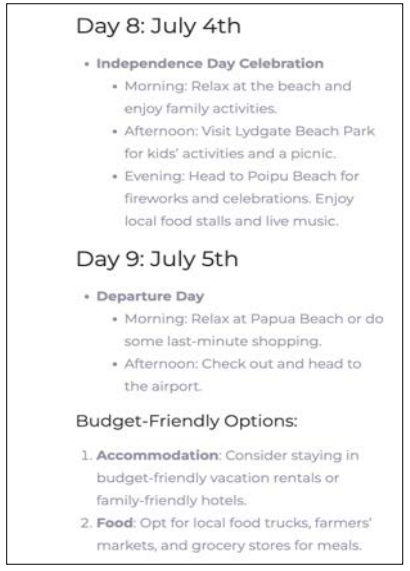
Figure 5: Page3 - Sample Itinerary
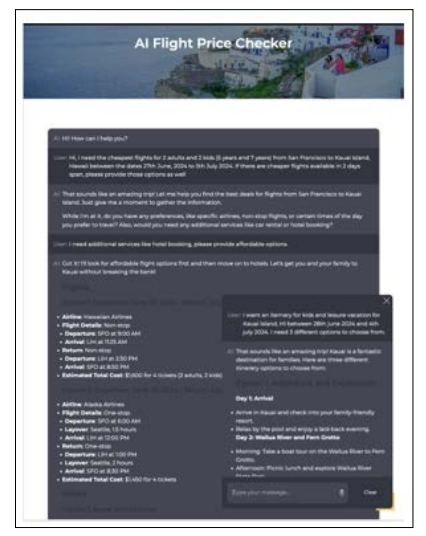
Figure 6: Page 1 - Flight and Hotel Price Finder Chatbot
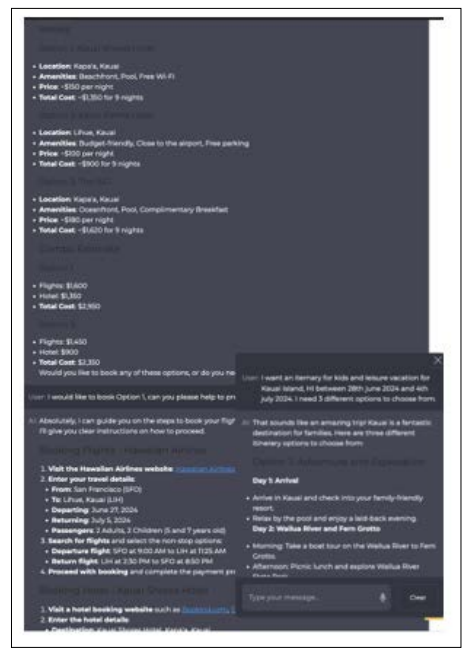
Figure 7: Page 2 - Flight and Hotel Price Finder Chatbot
The study involved 10 travelers who interacted with a travel website enhanced with Generative AI features, such as itinerary generation, low-fare finding, no-crowd planning, and route planning. Their feedback was collected based on 10 evaluation questions. This section presents a detailed analysis of their responses.
The responses to the survey questions were collected and analyzed to assess the effectiveness and user satisfaction of the AI-enhanced travel website. Below is a summary of the survey results.
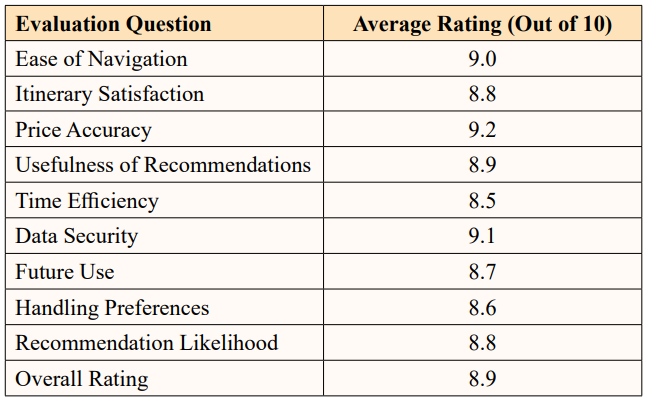
Result: The average rating for ease of navigation was 9.0. Analysis: Users found the AI-enhanced travel website to be highly navigable. The integration of AI likely contributed to a more intuitive and user-friendly interface. The high rating indicates that the website's design was successful in minimizing user effort and making travel planning straightforward. Users appreciated the seamless flow and easy access to various features, suggesting that the AI integration did not complicate the navigation but instead made it more efficient.
Result: The average rating for itinerary satisfaction was 8.8. Analysis: The AI-generated itineraries were well-received, with users appreciating the personalized and comprehensive travel plans.
This suggests that the AI effectively utilized the provided travel data to generate itineraries that matched user preferences. The ability of the AI to recommend suitable activities, accommodations, and dining options tailored to individual needs enhanced the overall satisfaction with the travel plans provided.
Result: The average rating for price accuracy was 9.2.
Analysis: Users were highly satisfied with the accuracy of the flight and hotel prices. Thanks to the integration of real-time pricing APIs, users received current and precise pricing information, essential for effective trip planning and budgeting. This high rating indicates that the AI reliably handled dynamic data and presented it accurately, enhancing trust and satisfaction in the travel planning process.
Result: The average rating for the usefulness of recommendations was 8.9.
Analysis: The personalized recommendations provided by the AI were found to be highly useful. This shows that the AI effectively analyzed user preferences and offered relevant travel suggestions. Users appreciated the AI's capability to customize recommendations based on their specific needs and preferences, which enhanced their overall planning experience.
Result: The average rating for time efficiency was 8.5. Analysis: While users found the AI-enhanced website to be time- saving, there is still room for improvement in optimizing the speed of travel planning. The AI's ability to quickly generate itineraries and find low fares contributed positively to this aspect. However, some users noted that further optimization could enhance the time- saving benefits, suggesting potential areas for future development.
Result: The average rating for data security was 9.1.
Analysis: Users felt confident in the security of their personal data while using the website. This high rating reflects the effectiveness of the advanced encryption and security protocols implemented. Ensuring data privacy and security is crucial for maintaining user trust, and the AI-enhanced website successfully addressed these concerns.
Result: The average rating for future use was 8.7.
Analysis: The majority of users indicated a high likelihood of using the AI-enhanced travel website for future travel planning. This suggests a strong user retention potential. The positive experience with the AI features and the overall satisfaction contributed to users' willingness to return to the website for their future travel needs.
Result: The average rating for handling preferences was 8.6. Analysis: The AI was effective in handling specific travel preferences and requirements, indicating that it could tailor its responses well to individual needs. Users appreciated the personalized approach and the AI's ability to accommodate their unique travel plans, enhancing the overall user experience.
Result: The average rating for recommendation likelihood was 8.8.
Analysis: Users were very likely to recommend the AI-enhanced travel website to others, showing their overall satisfaction with the AI's performance and the travel planning experience. Word-of- mouth recommendations are vital for growth, and the high rating suggests that users found the service both valuable and reliable.
Result: The overall rating given by users was 8.9.
Analysis: The high overall rating indicates that users were very satisfied with their experience using the AI-enhanced travel website. The generative AI features significantly contributed to improving the travel planning process, offering a blend of convenience, personalization, and efficiency.
The analysis of user preferences reveals several key insights: Navigation: Users appreciated the intuitive design and ease of use, which made travel planning straightforward and enjoyable. Itinerary Generation: Users highly valued personalized and detailed itineraries, indicating that the AI's recommendations closely matched their preferences and needs.
Price Accuracy: The real-time and accurate pricing information provided by the AI significantly boosted user satisfaction, enhancing trust and reliability.
Recommendations: Relevant and personalized travel recommendations stood out for users, showing the AI's effectiveness in understanding and catering to individual preferences.
Time Efficiency: While users generally found the AI-enhanced planning process time-efficient, there is room for further optimization to save even more time.
Security: The high confidence in data security reflects the robust implementation of privacy measures, which is crucial for user trust and confidence.
Future Use and Recommendations: High ratings in these areas show strong user loyalty and a willingness to endorse the service. This suggests that the AI-enhanced website successfully met user needs and expectations.
The integration of Generative AI into the travel website has effectively enhanced user experience and satisfaction. Users valued the AI's capability to deliver personalized itineraries, accurate pricing, and useful recommendations. While there are areas for improvement, especially in time efficiency, the positive feedback suggests that AI technologies have been successfully implemented in the travel sector. Future research should focus on refining these AI features and exploring new methods to make travel planning even more efficient and enjoyable. The study's findings highlight AI's potential to revolutionize the travel industry by offering more personalized, efficient, and secure travel planning solutions.
The adoption of Generative AI within the travel industry has led to a monumental shift in travel planning, driven by technological advancements. The study highlights the significant benefits of AI in personalized itinerary planning, cost predictions, and tailored recommendations. The AI-enhanced travel website demonstrated high usability, with users finding the interface easy to navigate and well-equipped to handle specific travel needs. While results were largely positive, the research identified areas for improvement, particularly in managing time efficiency. High overall satisfaction and the likelihood of future use and recommendations suggest that AI technologies have successfully met user expectations but have room for further development to enhance user experience. In conclusion, the research underscores the transformative capabilities of AI in modernizing the travel experience by making travel planning more personalized, efficient, and secure. By addressing identified challenges and continuously improving AI capabilities, the travel sector can leverage these technologies to offer even more rewarding and seamless travel experiences.
Algorithms for itinerary generation and price comparison need to be further optimized to increase velocity and efficiency for those AI-powered journey-planning processes. Future studies themselves need to include more people from more backgrounds to see that the results reported are generally true and extend across different types of people and travel preferences. Upgrading the level of sophistication of AI models that predict user preferences will result in more customized travel recommendations. Finally, the potential power of AIs for planning travel can be transformed when combined with nascent technologies such as integrated augmented reality (AR) and virtual reality (VR) experiences.
This can include ensuring that biases don’t sneak into the reasoning of the AI systems, allowing the systems to work fairly and ethically, and making them trustworthy to users. Making AI better at adapting to real-time changes (in a system that handles millions of prices, conditions of availability, or changes in user preferences every second, it has its challenges) will allow the system to provide the most accurate and up-to-date information. Studying the effects of replicating AI-based planners across devices and platforms can help ensure a seamless experience for the user. Addressing other future directions can help ensure that the travel industry continues to develop and improve the effectiveness and satisfaction of AI- based travel planning services [23-33].
